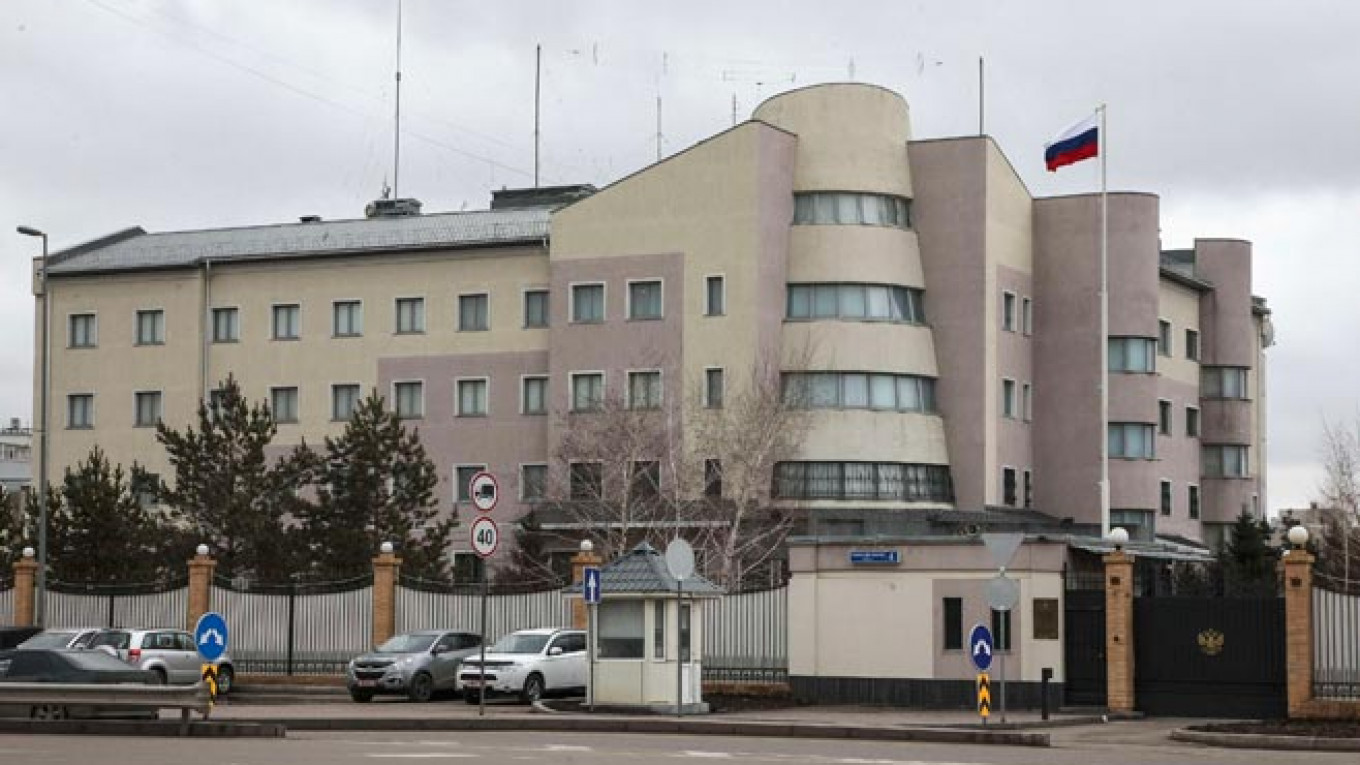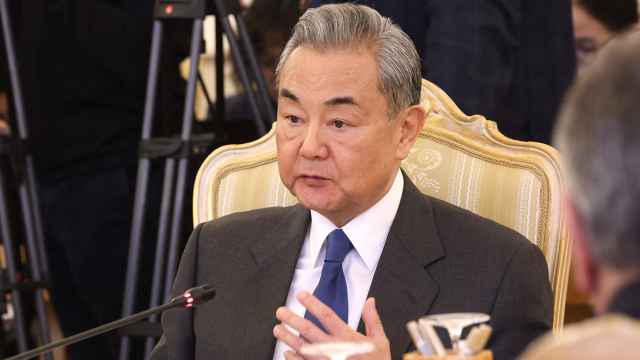For the latest update please see: JPMorgan Promises to Process Russian Embassy Payment in Bid to Ease Tension
JPMorgan has incurred the wrath of the Foreign Ministry after blocking a payment from a Russian Embassy, in what may be only the first such episode as foreign banks struggle to adapt to their new position in the foreign policy cross-fire triggered by the crisis in Crimea.
"We consider JPMorgan's decision completely unacceptable, illegal and absurd," a Foreign Ministry representative said in an official statement on the ministry's website late Tuesday.
The statement continues on a threatening note, calling hostile actions against a Russian embassy "not only an egregious violation of international law, but fraught with retaliatory measures that will inevitably effect the work of the American Embassy and general consul in Russia."
The payment was to be sent from the Russian Embassy in Kazakhstan to Russian insurance agency Sogaz, which is partly owned by Abros, a subsidiary of Bank Rossiya.
Bank Rossiya, the 15th-largest bank in Russia by assets, wound up on the U.S. sanctions list last month on account of its close ties with businessmen viewed as personal allies of President Vladimir Putin, including board chairman Yury Kovalchuk. U.S. officials said that the bank would be "frozen out of the dollar," Reuters reported.
The sanctions were implemented after nearly 97 percent of the population of the Ukrainian peninsula of Crimea voted in a Russian-backed referendum to secede from Ukraine and join Russia, a move that the United Nations general assembly declared invalid in a non-binding resolution last week. Armed forces widely believed to be Russian had seized control of the peninsula two weeks before the vote.
Other banks with significant U.S. exposure will also likely be compelled to block payments in and out of Bank Rossiya going forward, said Philip Halperin, an independent risk adviser and former chief risk officer at Alfa Bank, one of Russia's largest private banks.
The currency in which the transaction is conducted is very important, Halperin added. All dollar-denominated transactions must pass through the U.S. banking system and are hence subject to greater scrutiny by U.S. bankers and regulators.
The total value of the transaction blocked by JPMorgan was less than $5,000, an unidentified person familiar with the situation told Bloomberg, adding that JPMorgan can still process the payment if they receive the approval of U.S. regulators.
"As with all U.S. financial institutions that operate globally, we are subject to specific regulatory requirements," JPMorgan said in a statement. "We will continue to seek guidance from the U.S. government on implementing their recent sanctions."
The episode follows a similar incident in March, when Visa and MasterCard briefly stopped processing transactions at Russia's SMP Bank and Investcapitalbank after controlling shareholders Boris and Arkady Rotenberg, close associates of President Putin, appeared on the sanctions list.
The payment systems shortly thereafter renewed their operations. A Visa company spokesman told Itar-Tass that the U.S. government had instructed the company to do so, saying that the banks "do not meet the criteria for which sanctions are imposed."
Visa and MasterCard are not alone in their confusion. At this point, financial institutions operating in Russia genuinely do not know how they should respond to the U.S. sanctions, said Bernard Sucher, a board member at investment bank Aton and former country head of Bank of America Merrill Lynch in Russia.
This widespread disorientation was clear during a 200-person conference call hosted by a major law firm last week, during which the level of questioning was still extremely basic, Sucher said.
"This showed that not only is there huge interest, but that people really have not gotten up the curve yet on what the sanctions mean and are meant to mean and how they play out in practice," Sucher said.
The situation is fraught with uncertainties for an industry that is founded on the expectation of a seamless global platform of international commerce, he added.
"We are considering scenarios that are entirely unfamiliar to us from our personal experience and are deeply troubling. What happens if a substantial number of Russian actors are cut off from the dollar-based global financial system? How do you as a financial institution operate in dollars in such a system?" Sucher said.
While there are evidently grounds for concern, the parties involved also have strong interests in keeping financial relations out of the line of fire.
JPMorgan, for example, brought in $55.6 million in investment banking fees in Russia last year, with a 7 percent market share, Reuters reported, citing the company's annual report.
"I do not think there will be many instances like this at all," said Daniel Wolfe, whose more than 20 years in Russia have included top posts at investment bank Troika Dialog and investment advisory firm Alfa Capital Partners.
More importantly, it is also in the interests of the U.S. government to keep its financial system out of the political limelight. "The U.S. has to be very careful about how it uses the dollar and its payment systems as weapons of international policy," Wolfe said.
Giving the impression that the dollar serves U.S. foreign policy only provides China, Russia and the Middle East, who are already seeing a growing volume of trade in currencies other than the dollar, with further reason to create other reserve currencies and to move to non-dollar payment systems, Wolfe said.
Russia has already set off on the path to launching a national payment system on the urging of President Putin, who called attention to the issue at a meeting with the Federation Council last week, shortly after Visa and MasterCard briefly halted their services.
Putin cited the Chinese and Japanese systems as examples for Russia to follow. "They began as exclusively national, limited to their market, and now are gaining ever more popularity ... Why shouldn't we do this? We must and we will," Putin said, RIA Novosti reported.
German Gref, head of leading Russian lender Sberbank, said Monday that, pending certain amendments to Russian law, the national payment system could be launched within two to six months, according to a statement on the Kremlin website.
Domestic bankers also have a strong interest in maintaing equilibrium with foreign financial institutions, and some are stepping out now with dire warnings regarding the potential financial impact of the crisis.
Andrey Kostin, CEO of state-owned VTB bank and a former diplomat, on Wednesday described the current situation as "Cold War-like" and said that any Russian bank could face sanctions.
Metals and most natural resources are priced in dollars, meaning that for Russian banks, many of whose largest corporate clients are oil, gas and metal companies, not being able to operate in U.S. currency would be an "enormous inconvenience," Wolfe said.
And of course, "the banks make fees on all of those businesses running their payments through them on dollars," he added.
Contact the author at d.damora@imedia.ru
A Message from The Moscow Times:
Dear readers,
We are facing unprecedented challenges. Russia's Prosecutor General's Office has designated The Moscow Times as an "undesirable" organization, criminalizing our work and putting our staff at risk of prosecution. This follows our earlier unjust labeling as a "foreign agent."
These actions are direct attempts to silence independent journalism in Russia. The authorities claim our work "discredits the decisions of the Russian leadership." We see things differently: we strive to provide accurate, unbiased reporting on Russia.
We, the journalists of The Moscow Times, refuse to be silenced. But to continue our work, we need your help.
Your support, no matter how small, makes a world of difference. If you can, please support us monthly starting from just $2. It's quick to set up, and every contribution makes a significant impact.
By supporting The Moscow Times, you're defending open, independent journalism in the face of repression. Thank you for standing with us.
Remind me later.






